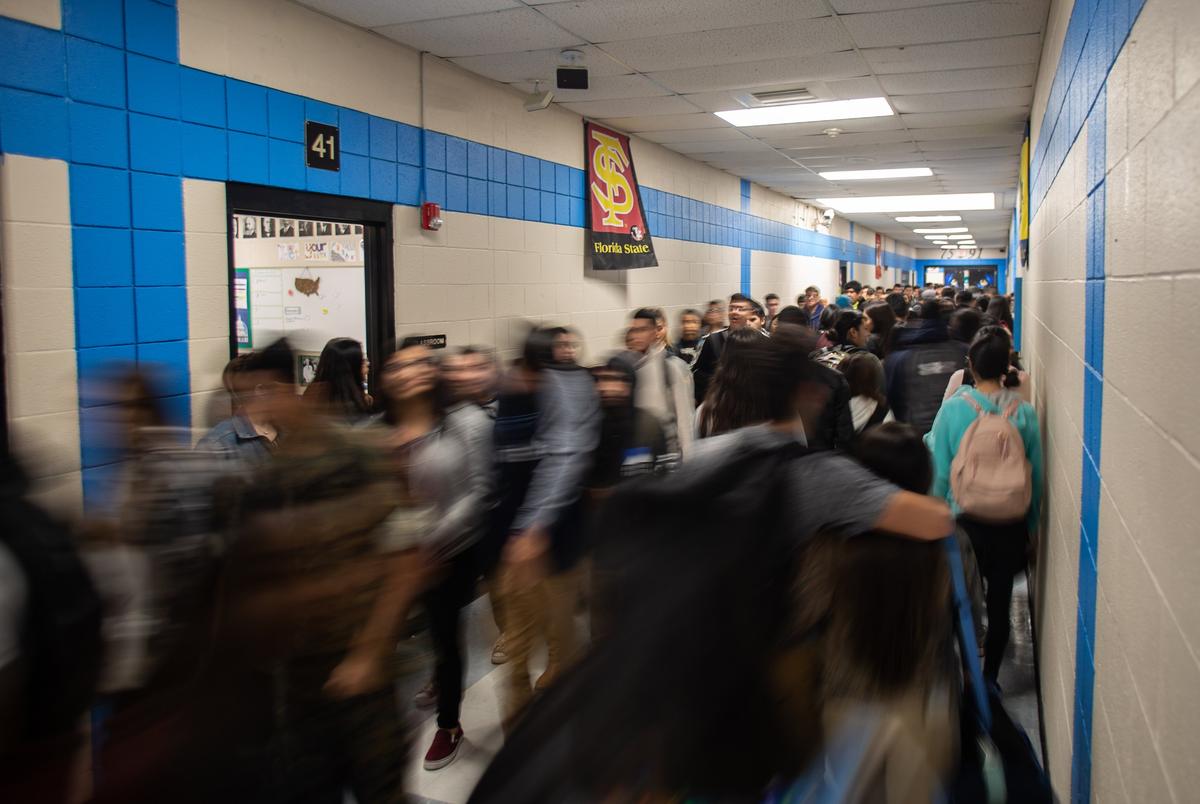
A top Texas senator filed legislation Monday that would extend the state’s ban on diversity, equity and inclusion initiatives to K-12 public schools.
Sen. Brandon Creighton, the Conroe Republican who chairs the Senate Committee on Education K-16, introduced both Senate Bill 12 and Senate Bill 1565 after Gov. Greg Abbott expressed support in his State of the State address earlier this month for Texas banning diversity practices across its more than 1,200 public school districts.
“It’s clear these programs are already in our schools using millions of taxpayer dollars meant for the classroom to fund political activism and political agendas,” Creighton said during a Senate Committee on Education K-16 hearing Thursday.
Advertisement
Advertisement
The introductory text in the legislation suggests school districts that fail to comply with the proposed DEI ban could lose out on funding, but neither bills specify how that would happen. Public schools receive funding primarily from local property taxes and the state budget.
Following the bill filing Monday, Erin Daly Wilson, the communications director for Creighton’s office, told The Texas Tribune that the bill would not withhold funding from school districts that violate the law.
SB 12, dubbed by Creighton the “Parental Bill of Rights,” would still make it illegal for Texas school districts to factor in diversity, equity and inclusion in hiring and employment decisions. It would prevent schools from developing policies, programs and training that reference race, ethnicity, gender identity or sexual orientation. It would require districts to create policies for disciplining employees who engage in or assign DEI-related tasks to others. And it would ban classroom instruction on gender identity and sexual orientation.
SB 1565 builds on that proposal by allowing parents to submit complaints to principals about alleged DEI violations and requiring school officials to offer parents an explanation of their response to the complaint. Parents could appeal the school’s response to the Texas Education Commissioner Mike Morath, who the bill requires to assign an arbitrator to review the complaint and conduct a hearing.
Advertisement
Advertisement
If education officials rule against a school district, the measure would require the superintendent to testify before the State Board of Education about the findings and the number of complaints against that district.
Advocates of the bills argued during Thursday’s hearing that DEI policies in public schools are not effective, waste taxpayer money and create division. Julie Pickren, a member of the State Board of Education, said Thursday that DEI programs “may appear well intentioned,” but they do more harm than good.
“DEI fosters a culture of entitlement and disappointments that will steal the American dream from kids,” Pickren said. “Every minute that we spend on ‘woke’ DEI indoctrination is a minute that we are not teaching a child how to read or how to do math.”
More in U.S.
Opponents of both bills testified that students from underrepresented groups would be hurt the most by a potential ban, including Black students and LGBTQ+ children. Critics say the ban could also make it more difficult for the state to recruit new teachers.
Advertisement
Advertisement
Sarai Flores, a policy fellow for the Mexican American School Board Association, testified Thursday that the ban would make it more difficult for schools to hire educators that reflect the communities they teach in. Though about three quarters of all public school students in the state are people of color, the majority of teachers in the state are white, according to Texas Education Agency data.
SB 12 would ban schools from factoring in diversity, equity and inclusion in hiring and employment decisions. That restriction would come as the state is facing a shortage of teachers without formal classroom training. Nearly 40% of new hires in Texas schools during the 2023-24 academic year lacked a state teaching teaching certification.
The bill, which Flores also called “vague and restrictive,” might also prevent teachers from having important discussions about race, history and identity due to the fear that they might violate the law, she added.
Other criticisms also centered on SB 12’s proposed ban on classroom instruction on gender identity or sexual orientation, reminiscent of the 2022 Florida “Don’t Say Gay” law that gained national attention. Several testified against that part of the bill Thursday, saying it would further negative stigmas toward LGBTQ+ students.
Advertisement
Advertisement
Dash Kostka, a student at the University of Texas in Austin, said LGBTQ+ students would be more likely to have mental health crises or face bigotry if teachers are banned from teaching about sexual orientation.
“Liberals like me are not trying to teach intersectional queer theory to your middle schoolers,” Kostka said. “We’re not trying to turn your kids gay.”
Neither of the proposals would prevent schools “from acknowledging or teaching the significance of state and federal holidays or commemorative months” or teaching how those holidays or months fit into Texas and U.S. history, according to the legislation.
The Texas Tribune reached out to several school districts to discuss the proposals Wednesday. At least one declined to comment, while others did not respond immediately.
Advertisement
Advertisement
Texas school districts oversee offices and programs responsible for helping ensure students of color, children learning English, kids from immigrant families, students with disabilities and others receive support and feel included on their campuses. Children of color comprise the overwhelming majority of Texas’ 5.5 million student population.
Jonathan Feinstein, state director for The Education Trust, told The Texas Tribune that it’s also unclear how a DEI ban could impact public school districts’ abilities to close achievement gaps among students. Under federal law, the state has a responsibility to close achievement gaps between students of different ethnic and racial backgrounds, he said. In Texas, Black and Latino students are more likely to read below grade level than their white counterparts.
“Would districts or poor charter schools be restricted from setting goals to explicitly close these gaps by improving academic outcomes for underperforming students?” Feinstein said.
Antonio Ingram, a lawyer at the NAACP’s Legal Defense Fund, testified Thursday against SB 12, saying it would harm all students, but especially Black students. He said that DEI programs are meant to “remediate disparities” that are present because of past segregation. A number of programs that benefit Black students could be on the chopping block, Ingram said, if the DEI ban moves forward.
Advertisement
Advertisement
“SB 12 may cause middle school administrators to curtail mentorship programs encouraging Black girls to pursue careers like engineering or medicine,” Ingram said. “SB 12 may cause high school counselors to discontinue implicit bias training [that helps] to prevent Black boys from receiving unjust discipline.”
Lawmakers in support of SB 12 and SB 1565, including Creighton, see it as an extension of the state’s ban on teaching “critical race theory” in K-12 public schools and a ban of DEI programs and policies in Texas’ public universities.
Critical race theory is a college-level discipline that examines why racism continues in American law and culture decades after the civil rights movement in the United States. It is not taught in elementary or secondary schools in Texas but some conservatives use the term to describe what they see as a liberal bent in the way race and racism is taught in public schools.
During the 2023 legislative session, Texas passed a law banning diversity offices, programs and training at publicly-funded universities. The law has caused confusion and fear among university employees and students, while colleges have shuttered DEI offices and efforts. Those offices also aimed to help Black, Latino, LGBTQ+ and other underrepresented students adjust to life on college campuses and foster a sense of community among their peers.
Advertisement
Advertisement
Abbott has since called on lawmakers to ensure that “no taxpayer dollars will be used to fund DEI” in K-12 public education.
“Schools must not push woke agendas on our kids,” Abbott said during his State of the State address in early February. “Schools are for education, not indoctrination.”
Those efforts mirror attempts to eliminate diversity at the federal level. On Feb. 14, the U.S. Department of Education issued a letter to schools across the country giving them two weeks to ban such efforts on their campuses and threatening a loss of funding if schools don’t comply. That window of time ends Friday.
Republicans nationally and in Texas often refer to any school activities attempting to create a more inclusive environment for children — such as teaching about systemic racism or allowing students to check out library books that center LGBTQ+ characters — as so-called “woke” liberal indoctrination.
Advertisement
Advertisement
State officials’ attempts to extend the diversity ban come as lawmakers continue to push for greater control over public schools and to allow taxpayer dollars to flow toward private ones. In 2021, the state passed a law limiting how Texas schools can teach America’s history of slavery and racism. The law instructs schools to teach those topics as “deviations from, betrayals of, or failures to live up to the authentic founding principles of the United States, which include liberty and equality.”
The governor and top officials in both the Texas House and Senate have made passing a school voucher bill their top priority this legislative session. At the same time, top Texas officials have expressed a desire to expand Christianity in the classroom. Lawmakers have filed legislation this session that would require schools to display the Ten Commandments, which Lt. Gov. Dan Patrick has declared a priority. Patrick is also prioritizing a bill that would grant school districts the power to provide students and employees “with an opportunity to participate in a period of prayer and reading of the Bible or other religious text” every school day.
A nod to Texas lawmakers’ aim to also expand so-called parental rights, the DEI bill filed Monday would also allow parents to apply to remove their children from their local school district to attend another. Under most circumstances currently, a child must attend the school district closest to where the student lives. In SB 12, the district the family applies to could deny the transfer request under certain circumstances, like if it lacks space to accommodate the child or if it has a policy prohibiting students with a criminal background.
We can’t wait to welcome you to the 15th annual Texas Tribune Festival, Texas’ breakout ideas and politics event happening Nov. 13–15 in downtown Austin. Step inside the conversations shaping the future of education, the economy, health care, energy, technology, public safety, culture, the arts and so much more.
Hear from our CEO, Sonal Shah, on TribFest 2025.
TribFest 2025 is presented by JPMorganChase.
EMEA Tribune is not involved in this news article, it is taken from our partners and or from the News Agencies. Copyright and Credit go to the News Agencies, email news@emeatribune.com Follow our WhatsApp verified Channel




